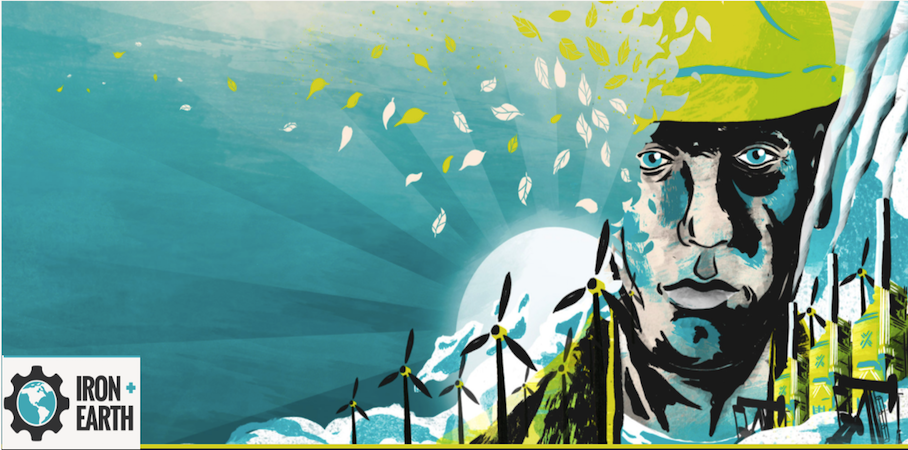
In our current energy transition dialogue, we’re used to separate and fragmented conversations from opposing viewpoints. The conversations generally hold a lot of emotion including apprehension, fear and frustration.
There isn’t yet a wealth of examples, outside the Energy Futures Lab, that builds trust across the boundary that pins “us” against “them.”
Leor Rotchild recently talked with Lliam Hildebrand, the newest Energy Futures Fellow, on how his organization Iron & Earth is creating a critical new conversation that aspires to build a stable future for Alberta workers, their families and their communities. Unsurprisingly, a lot of people are taking notice.
We’re so dependent on our carbon-based energy sector and industrial energy sector jobs, and it’s left us very vulnerable.
Leor: What is Iron & Earth?
Lliam: Iron & Earth is a worker-led non-profit organization committed to catalyzing the renewable energy sector in Canada.
Leor: Why did you feel the need to start this organization?
Lliam: It actually began on a job site a year ago when oil prices were crashing, unemployment was rising, and my coworkers and I realized very clearly that we needed to begin diversifying our work scope into renewable energy. We’re so dependent on our carbon-based energy sector and industrial energy sector jobs, and it’s left us very vulnerable. My coworkers convinced me to start this.
Leor: What’s your professional background exactly?
Lliam: I’m a double-ticketed tradesman. I have a red seal in welding and I have a red seal in steel fabrication. I’ve been in the boilermakers’ union for over a decade now and I have also worked in the oil sands for the last six years while going through an undergraduate degree in geography. I’m currently a year into a two-years Masters program at Royal Roads and continue working the oil sands.
Leor: What do you hope Iron & Earth will achieve?
Lliam: I hope that Iron & Earth can do three things. First, we need to ensure we’re building our workforce capacity in Alberta and Canada to be able to build these renewable energy products. I think we also want to build up the manufacturing capacity so that we can produce renewable energy products and export them to other countries as a commodity. Third, we want to build a community of like-minded coworkers who can feel a sense of shared purpose, a shared vision, and come together to help ensure Canada can thrive in a renewable energy economy.
Leor: When you see the debate between climate change and jobs, pipelines or turbines, what are your thoughts about where the universal opportunity lies? How we can all move forward together?
Lliam: The commonality is this incredible specialization in industrial manufacturing, especially in the province of Alberta. We have an incredible amount of contractors, developers, and manufacturers who are specialized in very, very large-scale projects. I think we are going to rely on the existing oil sands infrastructure for a number of decades. While the new construction in that sector starts to slow down, we can also find a new commonality in industrial-scale renewable energy development.
Leor: What do you think is the role of oil and gas in a sustainable energy future?
Lliam: The role of oil and gas in a sustainable energy future is primarily with the companies and contractors, as well as the workers, that are going to be actually developing these renewable energy products and projects. It’s really inspiring to see companies like Suncor and Enbridge start to embrace and move into the forefront as renewable energy developers.
Leor: What’s the response been like to Iron & Earth and what you’re saying?
Lliam: It’s been overwhelming. It’s been incredible. We just launched a month ago and we are already at over 400 worker-members who are a part of our organization and about 4,000 pledge supporters now. We’ve already had meetings with the Government of Alberta and the federal government. Within a month a lot has happened.
Leor: What can you share in terms of the relationship with some of the trades unions and how they are responding to your message?
Lliam: Our relationship with the unions is very interesting so far. We actually started out with development of a renewable energy activation program for our union to position themselves within the renewable energy section as a six-phase program looking at the high growth technologies, how we can capture that work scope. Our union leadership was very engaged in conversations with us around that and we learned a lot together and we continue to be in conversations with them, but, unfortunately right now they’re not willing to take that leap. A lot of our members are really hoping our union is going to embrace renewable energy and are pretty terrified about what will happen if we don’t.
Leor: Do you have a call to action you’d like to share with people, whether they’re a funder, part of the general public, other union members, or tradespeople?
Lliam: I’d encourage people to please sign our pledge and fill out their contact information. We’ll be engaging with everyone that signs the pledge. Please invite any workers you know to become a part of our organization, because our strength is going to come from developing a community of like-minded workers. Together, we’ll push renewable energy development policies and programs forward.

Leor Rotchild is a consultant with the Energy Futures Lab



